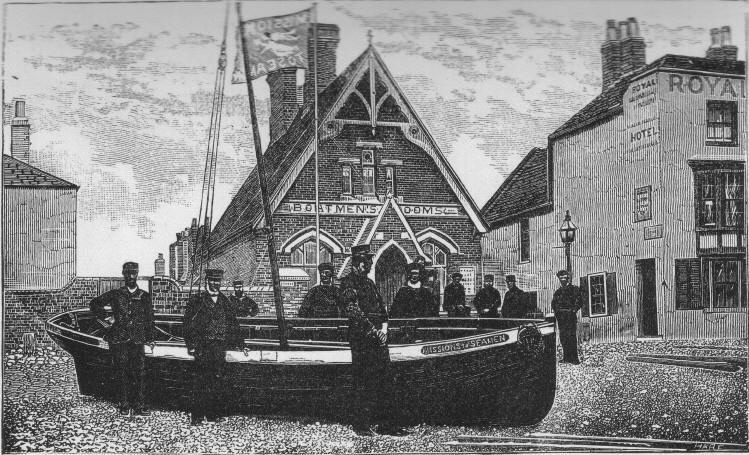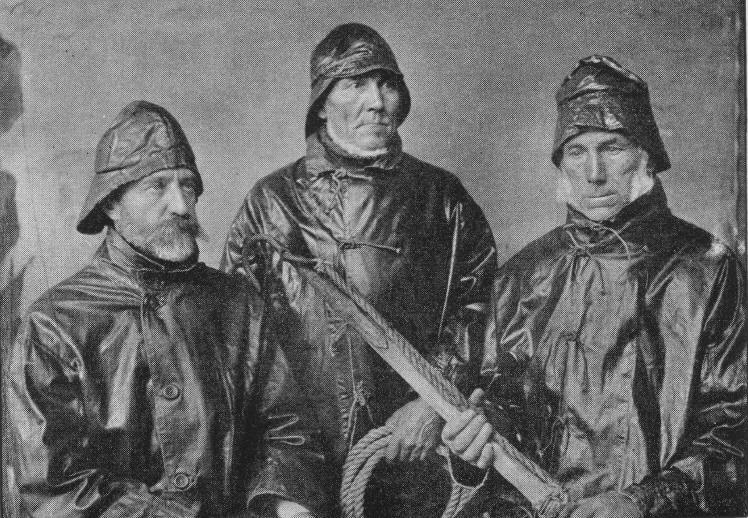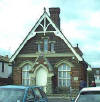The Missions to Seamen Society

"The beautiful boat rode well in the breaking sea, driving her nose into each wave, and then riding over it like a seagull, being carefully watched and tended by my two Mission boatmen, old friends and dear comrades, who remained in the boat. On her bows was emblazoned the angel-flag of 'Missions to Seamen' in blue and gold, and on her quarters and on her stern the same title appeared, over which, every moment, cascades of the sea-spray glistened like showers of diamonds in the sunlight."
The crew in 1894 comprised (below, left to right): Rev. Treanor (Steersman), George Norris (Coxswain) and Stephen Wilds (Bowman)

I told him we were at sea nearly every day, and in all weathers."
The job of Chaplain to the Mission involved visiting not only ships at anchor in the Downs, but also the lightships that guarded the Goodwin Sands. The Chaplain would be rowed out in all weathers to minister to the crews and passengers of the many ships that passed through the narrow stretch of water between Deal and the Sands.
"On another occasion we were as usual afloat, and towards the close of our day's work we ran, under a press of sail, under the stern of a schooner lying at anchor in the Downs about two miles from land. We shot up along the vessel's side, the powerful weighty boat having sufficient 'way' on her to run up against the current of the tide, which ran strongly." (the Straits of Dover have some of the strongest currents of any sea lanes in the world) "As we 'shot up' we hauled down the sail with all our might, and got out the fenders, to protect our boat's gunwale and side, keeping a sharp lookout lest any brace or outlying spar should catch our mast overhead. Just as the bowman got his boat-hook with long cable of 'coir' rope attached into the vessel's fore-chains, I, being at once chaplain and steersman, sheered the boat's head a little out, so that she should ride safely off from the schooner's sides. The captain put his head over his bulwark top rail, and seeing as he thought three fishermen or Deal boatmen dressed in oilskins, sou'westers and sea-boots, alongside him, and not noticing the emblazonments of 'Missions to Seamen' on our boat, saw a chance of getting some help on easy terms for his crew, who were working hard to get up their anchor. The captain accordingly shouted to us: 'Come on board and help me to get my anchor.'"
The small Welsh crew, were struggling to get the anchor off the sticky clay bottom in a depth of 10 fathoms, so Rev. Treanor and his crew decided to give a hand. After getting the anchor up and setting the head-sail to get the ship under way, the Rev. walked aft to speak to the captain.
"He silently thrust his brown hairy right paw, hard with honest sailor toil, down into the cavernous recesses of the deepest pocket I ever remember to have seen, and having selected by the sense of touch the suitable coin, he pulled it out and handed it to me with the words, 'There's a shilling for you.'
I said, 'Thank you all the same, but I won't take it.'
'Why,' said he, 'it's a good shilling!'
'Doubtless,' I said, 'but I'm a parson.'
'Church of England?' said he in a feeble voice, as his face lengthened and his mouth slowly opened.
'Yes,' I said; 'we're glad to help you.'
The poor fellow was literally struck dumb, but this little incident was a most favourable preparation for the message of the Gospel and his reception of it."
After handing out tracts in Welsh to the crew, and giving them English books and hymn-books, Rev. Treanor shook hands with the crew and preached to them about the faith of Christ. He sold the captain a Welsh bible before taking leave of them.
"The vessel now moving fast through the water, and with grateful affection, as if we were old friends and comrades, they bade us farewell. We got over the side and cast off the boat-hook. Gradually the other sails were set on the little vessel, and at last she disappeared to the southward, and we saw her no more."
The boat carried Bibles and tracts in 20 languages and the Prayer Book in about 10 languages. In addition, they carried many volumes of "useful and interesting" books, as well as tracts, magazines, copies of the Illustrated London News and Graphics, almanacs and as many as 100 hymn-books for the day's work. Not forgetting, of course, pledge-cards, medals and literature for the Temperance Society!
At certain times, particularly around Christmas, they would also carry waterproof bags, "mufflers and mittens, needle-cases and helmets" for sailors, all made by the "skilful and loving hands of many ladies".
For much more information on the work of the "Sky Pilot" in the Downs, the book is available for loan from the Local Studies Collection of Deal Public Library.
